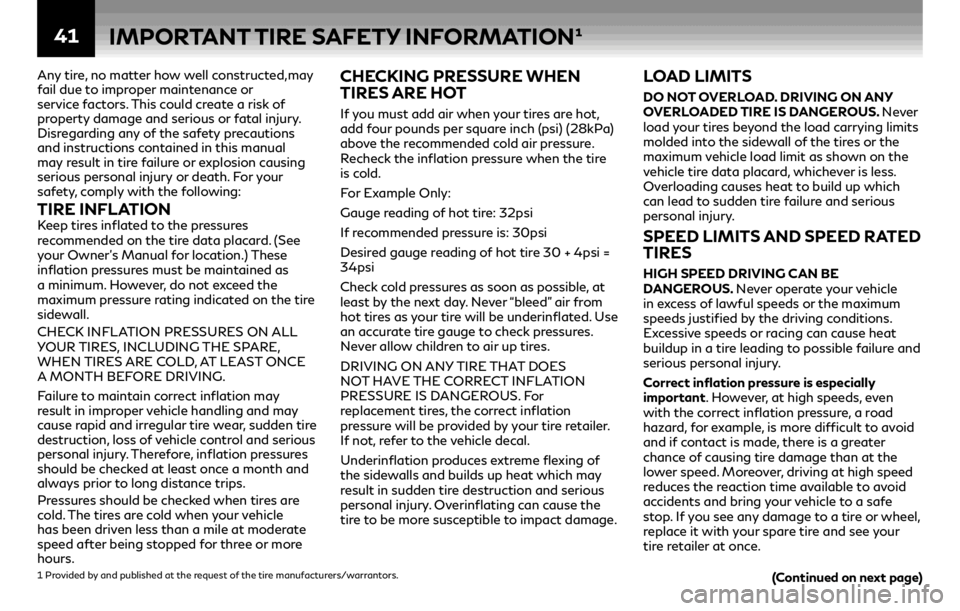ECO mode INFINITI QX80 2019 Warranty Information Booklet
[x] Cancel search | Manufacturer: INFINITI, Model Year: 2019, Model line: QX80, Model: INFINITI QX80 2019Pages: 60, PDF Size: 0.25 MB
Page 2 of 60

Infiniti, the Infiniti logo, and Infiniti model names are Infiniti trademarks.
©2018 Nissan North America, Inc.
All rights reserved. No part of this publication may be reproduced or stored in a retrieval system, or transmitted in any
form, or by any means, electronic, mechanical, photocopying, recording or otherwise, without the prior written
permission of Nissan North America, Inc.
Page 44 of 60

41IMPORTANT TIRE SAFETY INFORMATION¹
Any tire, no matter how well constructed,may
fail due to improper maintenance or
service factors. This could create a risk of
property damage and serious or fatal injury.
Disregarding any of the safety precautions
and instructions contained in this manual
may result in tire failure or explosion causing
serious personal injury or death. For your
safety, comply with the following:
TIRE INFLATION Keep tires inflated to the pressures
recommended on the tire data placard. (See
your Owner’s Manual for location.) These
inflation pressures must be maintained as
a minimum. However, do not exceed the
maximum pressure rating indicated on the tire
sidewall.
CHECK INFLATION PRESSURES ON ALL
YOUR TIRES, INCLUDING THE SPARE,
WHEN TIRES ARE COLD, AT LEAST ONCE
A MONTH BEFORE DRIVING.
Failure to maintain correct inflation may
result in improper vehicle handling and may
cause rapid and irregular tire wear, sudden tire
destruction, loss of vehicle control and serious
personal injury. Therefore, inflation pressures
should be checked at least once a month and
always prior to long distance trips.
Pressures should be checked when tires are
cold. The tires are cold when your vehicle
has been driven less than a mile at moderate
speed after being stopped for three or more
hours.
CHECKING PRESSURE WHEN
TIRES ARE HOT
If you must add air when your tires are hot,
add four pounds per square inch (psi) (28kPa)
above the recommended cold air pressure.
Recheck the inflation pressure when the tire
is cold.
For Example Only:
Gauge reading of hot tire: 32psi
If recommended pressure is: 30psi
Desired gauge reading of hot tire 30 + 4psi =
34psi
Check cold pressures as soon as possible, at
least by the next day. Never “bleed” air from
hot tires as your tire will be underinflated. Use
an accurate tire gauge to check pressures.
Never allow children to air up tires.
DRIVING ON ANY TIRE THAT DOES
NOT HAVE THE CORRECT INFLATION
PRESSURE IS DANGEROUS. For
replacement tires, the correct inflation
pressure will be provided by your tire retailer.
If not, refer to the vehicle decal.
Underinflation produces extreme flexing of
the sidewalls and builds up heat which may
result in sudden tire destruction and serious
personal injury. Overinflating can cause the
tire to be more susceptible to impact damage.
LOAD LIMITS
DO NOT OVERLOAD. DRIVING ON ANY
OVERLOADED TIRE IS DANGEROUS. Never
load your tires beyond the load carrying limits
molded into the sidewall of the tires or the
maximum vehicle load limit as shown on the
vehicle tire data placard, whichever is less.
Overloading causes heat to build up which
can lead to sudden tire failure and serious
personal injury.
SPEED LIMITS AND SPEED RATED
TIRES
HIGH SPEED DRIVING CAN BE
DANGEROUS. Never operate your vehicle
in excess of lawful speeds or the maximum
speeds justified by the driving conditions.
Excessive speeds or racing can cause heat
buildup in a tire leading to possible failure and
serious personal injury.
Correct inflation pressure is especially
important. However, at high speeds, even
with the correct inflation pressure, a road
hazard, for example, is more difficult to avoid
and if contact is made, there is a greater
chance of causing tire damage than at the
lower speed. Moreover, driving at high speed
reduces the reaction time available to avoid
accidents and bring your vehicle to a safe
stop. If you see any damage to a tire or wheel,
replace it with your spare tire and see your
tire retailer at once.
(Continued on next page)1 Provided by and published at the request of the tire manufacturers/warrantors.